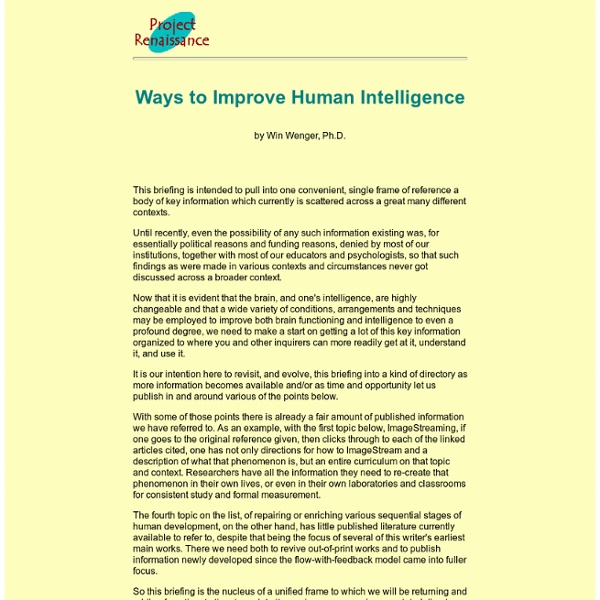Researchers list chemicals endangering 'the next generation of brains'
The biggest window of vulnerability to chemicals occurs in utero, during infancy and early childhood, experts say. Two scientists are sounding the alarm over chemicals and brain developmentThey are calling for a worldwide overhaul of the regulatory processThe American Chemical Council says the review is "highly flawed"The researchers say impacts could include ADHD and dyslexia (CNN) -- The number of chemicals known to be toxic to children's developing brains has doubled over the last seven years, researchers said. "We know from clinical information on poisoned adult patients that these chemicals can enter the brain through the blood brain barrier and cause neurological symptoms," said Grandjean. "When this happens in children or during pregnancy, those chemicals are extremely toxic, because we now know that the developing brain is a uniquely vulnerable organ.
7 Skills To Become Super Smart
People aren’t born smart. They become smart. And to become smart you need a well-defined set of skills. Here are some tips and resources for acquiring those skills.
Attention Is the Most Basic Form of Love
Attention is the most basic form of love. Through it we bless and are blessed. -- John Tarrant There is an epidemic ravaging the health and happiness of American families. We simply have no time for each other.
Neurodegenerative Disorders
More than 600 disorders afflict the nervous system. Neurodegenerative diseases are defined as hereditary and sporadic conditions which are characterized by progressive nervous system dysfunction. These disorders are often associated with atrophy of the affected central or peripheral structures of the nervous system. They include diseases such as Alzheimer's Disease and other dementias, Brain Cancer, Degenerative Nerve Diseases, Encephalitis, Epilepsy, Genetic Brain Disorders, Head and Brain Malformations, Hydrocephalus, Stroke, Parkinson's Disease, Multiple Sclerosis, Amyotrophic Lateral Sclerosis (ALS or Lou Gehrig's Disease), Huntington's Disease, Prion Diseases, and others.
Living in the Present Is a Disorder
The opening titles sequence of Game of Thrones conveys a presentist style. Image: HBO We’re living in the now, we no longer have a sense of future direction, and we have a completely new relationship to time.
Is love an addiction
In the early days of a new romance, it's oh so easy to let friends, work and other areas of your life fall by the wayside as you spend all of your time focused on your new love. In many ways, this all-consuming love can be a lot like an addiction, with each condition characterized by a lack of control, or even a sense of obsession. When psychiatrist Donatella Marazziti studied the brain chemistry of people in love, she found that the levels of serotonin in their brains were much lower than normal [source: BBC]. In fact, people in love exhibited the same low serotonin levels as people with obsessive-compulsive disorders. Serotonin, a neurotransmitter found in the brain, is responsible for regulating mood, impulse control and even how we handle our inhibitions. People with low serotonin levels often exhibit signs of uncontrollable obsession with, or addiction to, love, compulsive behaviors or even drugs and alcohol.
New Study Finds Fructose Alters Genes in the Brain, Sabotages Learning and Memory
5th May 2016 By Carolanne Wright Contributing writer for Wake Up World
Normal distribution
In probability theory, the normal (or Gaussian) distribution is a very commonly occurring continuous probability distribution—a function that tells the probability that an observation in some context will fall between any two real numbers. Normal distributions are extremely important in statistics and are often used in the natural and social sciences for real-valued random variables whose distributions are not known.[1][2] The normal distribution is immensely useful because of the central limit theorem, which states that, under mild conditions, the mean of many random variables independently drawn from the same distribution is distributed approximately normally, irrespective of the form of the original distribution: physical quantities that are expected to be the sum of many independent processes (such as measurement errors) often have a distribution very close to the normal. The Gaussian distribution is sometimes informally called the bell curve. A normal distribution is The factor
Five Nutrients to Anti-Age Your Brain
Researchers agree that our diets, exercise regimes, and sleep patterns alter our brain health and mental function for better or worse. This supports the exciting possibility that improving our diets is a viable strategy for enhancing cognitive abilities, protecting the brain from damage and counteracting the effects of aging. Of particular interest are five brain rejuvenating nutrients that can help you maintain cognitive function and memory.
Recognition primed decision
Recognition-primed decision (RPD) is a model of how people make quick, effective decisions when faced with complex situations. In this model, the decision maker is assumed to generate a possible course of action, compare it to the constraints imposed by the situation, and select the first course of action that is not rejected. RPD has been described in diverse groups including Whitewater kayaking Trauma nurses, fireground commanders, chess players, commercial Whitewater river guides and stock market traders. It functions well in conditions of time pressure, and in which information is partial and goals poorly defined.



